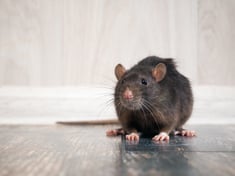Known for sports, education, culture, and rich history, Boston is deemed one of the best places to live on the East Coast; unfortunately, it's not just people who feel that way - pests tend to agree. In recent years, Boston residents and business owners have been battling an ever-growing population of rats, which is not only a nuisance, but a health hazard.
 Rats are most active at night, so you're more likely to notice the signs of their presence than you are to see an actual rat - that's why it's important to know exactly what to look for. These are some red flags that hint at rats making themselves comfortable in your Boston home.
Rats are most active at night, so you're more likely to notice the signs of their presence than you are to see an actual rat - that's why it's important to know exactly what to look for. These are some red flags that hint at rats making themselves comfortable in your Boston home.
Droppings. This is one of the most obvious signs of a rodent problem, and one of the more hazardous ones: Many rodent-borne diseases are spread through contact with droppings or body fluids, so be sure to protect yourself when cleaning up droppings.
Noises. You may hear scratching, scurrying, chewing, or thumping in walls or attic space. Noises may increase at nighttime.
Rub marks and tracks. Footprints or greasy-looking marks can clue you in to areas rodents might be frequenting; the oils in their fur or dirt on their bodies leave smudges on objects and surfaces they are in contact with often.
Nests. Nests can often be found in attics, eaves, garages, and even inside walls. Rat nests are made of various scavenged materials such as insulation, cardboard, or cotton.
Holes/burrows. Rats build burrows, often close to a structure and/or food source, to use for shelter, nesting, and food storage.
Where do rats live?
Outside, rats may take up residence under or around deck spaces, in sheds or garages, and among vegetation. Make sure garbage bins close securely and check the lid and base for holes or signs of chewing. Eliminate other food sources and keep grass and shrubs trimmed to make your yard less attractive to rats.
Once inside a home, rats prefer hidden areas such as attics, crawlspaces, drop ceilings, and inside walls. Because they are also drawn to warmth, don't forget to look behind stoves, dishwashers, or dryers.
What do I do if I think rats are in my home?
Because of rapid reproduction rates and the health hazards rats can pose, it's important to take action quickly if you notice signs of rats infiltrating your home. Rather than put yourself at risk with DIY methods, call a rodent control professional right away. The experts at Burgess Pest are here to keep your Boston home rat-free all year long, with Pad Protection Plans and Home Sealer & Sanitizer Service + Insulation Cleanout - and it all starts with a free estimate.
Want more rodent season survival tips? Download our free guide here!


